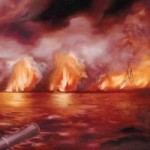Review
Pitchfork
March 16, 2010
Link
7.8

You can only be the dark horse once. The Besnard Lakes may have been a (mostly) unknown quantity when they broke out to a wider audience in 2007, but they were also insiders of sorts– guitarist/vocalist Jace Lasek had done production work with Montreal heavyweights Wolf Parade and Sunset Rubdown. Fitting of its title, Are the Dark Horse had a subtle, almost shy, quality– on many songs, the group’s quiet side slowly swelled into a symphony. On the follow-up, Are the Roaring Night, husband-and-wife duo Lasek and Olga Goreas map out a sonic landscape that follows the peaks and valleys of their previous work, but the terrain is more ragged.
New songs like “Glass Printer” sound more electrified and easily triggered from the outset. Marching forward with the inexorable, unforgiving pace the title implies, “And This Is What We Call Progress” pairs a steely two-drum pulse with a line of static suspended by an EBow. Even the slow, pretty interludes often exude more tension than the suspended-in-space, Spiritualized vibe of an older song like “For Agent 13”. There’s more unease in the band’s bold space rock– vocal harmonies mask that sense of menace on the two-part “Like the Ocean, Like the Innocent”, which opens the album with oscillating notes and fluctuating guitar. After trading cloying choruses with Goreas, Lasek sings, “Deciphered your lines from the short wave/ It said ‘Kill all the swine, young and old.'” Darkness and destruction are also central to “Land of Living Skies”, made even more poignant after an opening segment of sinister radio transmissions.
Talk of scrambled signals and short-wave technology is fitting considering Lasek’s production background (check out the online gear list for his Breakglass studio). An impressive array of crunchy guitar tones courses throughout the album, pushing forward two-part epics so the steady cycle of build and release doesn’t become overwrought. Craftsmanship permeates the peels of reverb-laden melodies or the Loveless-like gyre of lead single “Albatross”. Are the Roaring Night sounds richer, and while it doesn’t rewrite the formula, it contains many small refinements to the band’s songwriting and production skills. Outside of the twinkling, sub-orbital synths on the closer “The Lonely Moan”, there isn’t anything that would be considered a radical departure. But when you make the kind of entrance the Besnard Lakes did, there isn’t much to fix.